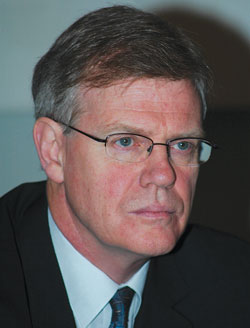|
|
Nepali Times: How has the Commission looked at events in Nepal in the past year? James Moran: It's been an extraordinary year for Nepal and attention in Europe has certainly intensified. A year ago, there was the prospect of civil strife and Nepal was sort of put on the list of countries to be worried about. Things have of course moved on and you are now embarked on a process that is regarded in Europe as one of hope. This is important for Nepal, for the bilateral relations between the EU and Nepal, and I dare say, also for the region, where there are a lot of unresolved conflicts: Sri Lanka, Kashmir, Bangladesh's difficulties with its own elections. Seen from the South Asian perspective, Nepal is carrying the banner of hope for progress.
What is your assessment of how things are moving?
I was here with the EU Troika Mission in November just before the signing of the agreement with the parties and this time we are here to talk about our cooperation agreement. But as far as I can tell, you have enormous number of challenges still to face up to. But Nepal is on track, it's holding.
On cooperation, are you going to wait for things to get totally normal?
No we're not. The fact that we're here talking with our Joint Commission shows you that there has been a lot of progress in the last couple of months. We have been preparing our new strategy paper on Nepal for the next six years and this will be presented very soon in Brussels. It will focus on the social sectors, education, and consolidation of the peace process, where effort is needed. We have an exploratory mission on election observation that is finishing off its work now. So a number of actions are underway already.
India and China are regarded as Europe's strategic partners, how has relations evolved with these two giants?
It's certainly one of the great challenges we have in this century for Europe to get our relations right with both those countries. With China we've had a strategic parternship and we've had a honeymoon with China for the last five years economically and politically. China is now our second largest trading partner and with current trends it will be the largest in five years, overtaking the US. There are 20,000 European companies operating in China. And then of course there is a whole political agenda out there, especially on the multilateral front. I'd say relations with China have matured very rapidly in the last three or four years so it's completely unrecognisable. What we need to get with China is a more balanced relationship than we've had up to now.
With India, until relatively recently, it was a more classical development-driven relationship but again there things are changing, as India, which has traditionally not been a big player outside of its region, emerges on the world stage. India's role in the region is also interesting, in particular its very constructive role in Nepal. It's something that may not have been possible for them until recently, since they have generally not welcomed a multilateral role. But here in Nepal I get the impression they've been quietly supportive of the United Nations' role, which is central. These are good signs.
What is the EU's view on third country repatriation proposal for Bhutani refugees?
It's an issue which is causing us a bit of pain lately. We've been the main financiers of the refugee camps for many years and you know we do this because of the humanitarian imperative. But the question is raised why Nepal and Bhutan can't sort this out among themselves and find a political solution. We certainly see the American offer to settle 60,000 of the refugees as a positive development, but at the same time we understand that in Nepal this may be looked at sceptically because it may be taken as a signal that this is a way for further refugee arrivals to find a better life overseas. Meanwhile we are left to foot the bill, and politically it's getting a bit difficult because there is some fatigue.



